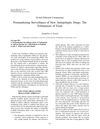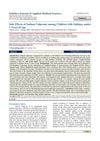LHA™
Research
18 / 18 results
research Improving Human Forensics Through Advances in Genetics, Genomics, and Molecular Biology
DNA profiling in forensics has improved, but predicting physical traits and ancestry from DNA has limitations and requires ethical consideration.

research Endogenous Retinoids in the Hair Follicle and Sebaceous Gland
Maintaining the right amount of retinoic acid is crucial for healthy hair and skin.

research Gata6 Promotes Hair Follicle Progenitor Cell Renewal by Genome Maintenance During Proliferation
Gata6 is important for protecting hair growth cells from DNA damage and keeping normal hair growth.

research miR-195-5p Regulates Hair Follicle Inductivity of Dermal Papilla Cells by Suppressing Wnt/β-Catenin Activation
miR-195-5p reduces hair growth ability in cells by blocking a specific growth signal.

research Insights on the Mechanical Behavior of Keratin Fibrils
Keratin's mechanical properties are influenced by hydrogen bonds and secondary structure, and can be improved with the SPD-2 peptide.

research Postmarketing Surveillance of New Antiepileptic Drugs: The Tribulations of Trials
Monitoring new epilepsy drugs after they're sold is crucial to find rare and long-term side effects that initial tests might miss.

research Lymphatic Vessel: Origin, Heterogeneity, Biological Functions, and Therapeutic Targets
Lymphatic vessels are essential for health and can be targeted to treat various diseases.

research Polycystic Ovary Syndrome: A Psychosocial Approach
Polycystic ovary syndrome (PCOS) significantly impacts women's emotional well-being and social lives, requiring treatments that include psychological support.

research Alk1 Acts in Non-Endothelial VE-Cadherin+ Perineurial Cells to Maintain Nerve Branching During Hair Homeostasis
Alk1 in specific cells is crucial for proper nerve branching and hair function.

research Comparative Study of the Effectiveness of Intradermotherapy With or Without Microneedling and Topical Solution in Reducing Hair Loss in Men With Androgenetic Alopecia
Combining intradermotherapy with microneedling and a topical solution reduces hair loss more effectively than intradermotherapy alone.

research Side Effects of Sodium Valproate Among Children With Epilepsy Under 2 Years of Age
Sodium valproate caused vomiting, hair loss, loss of appetite, abdominal pain, weight gain, and anemia in young children with epilepsy.
research Development of a Simple Selection Protocol for Optimizing the Harvest of Mesenchymal Stem Cells from Explanted Human Umbilical Cord Wharton's Jelly
A new method improves stem cell harvest from umbilical cords, reducing time and cost.
research Lymphatic Vasculature and Hair Follicle Regeneration
Lymphatic vessels help hair follicles regenerate by interacting with stem cells.
research Solid Lipid Nanoparticles for Drug Delivery: Pharmacological and Biopharmaceutical Aspects
Solid lipid nanoparticles are promising for safe and effective drug delivery but need more research for clinical use.
research Pain in Multiple Sclerosis: Understanding Pathophysiology, Diagnosis, and Management Through Clinical Vignettes
Effective pain management in multiple sclerosis requires individualized treatment strategies.
research The Crest Phenotype in Domestic Chicken Is Caused by a 195 bp Duplication in the Intron of HOXC10
A 195 bp duplication in the HOXC10 gene causes crests in domestic chickens.
research Mental Health Impact of Dengue Fever
Dengue fever can cause significant mental health issues like anxiety and depression.
research Using Sodium Valproate in Children Under 2 Years of Age: Study in a District Hospital, Dinajpur, Bangladesh
Sodium valproate caused vomiting in 20% of children under 2 years old, with other side effects like hair loss and loss of appetite also noted.